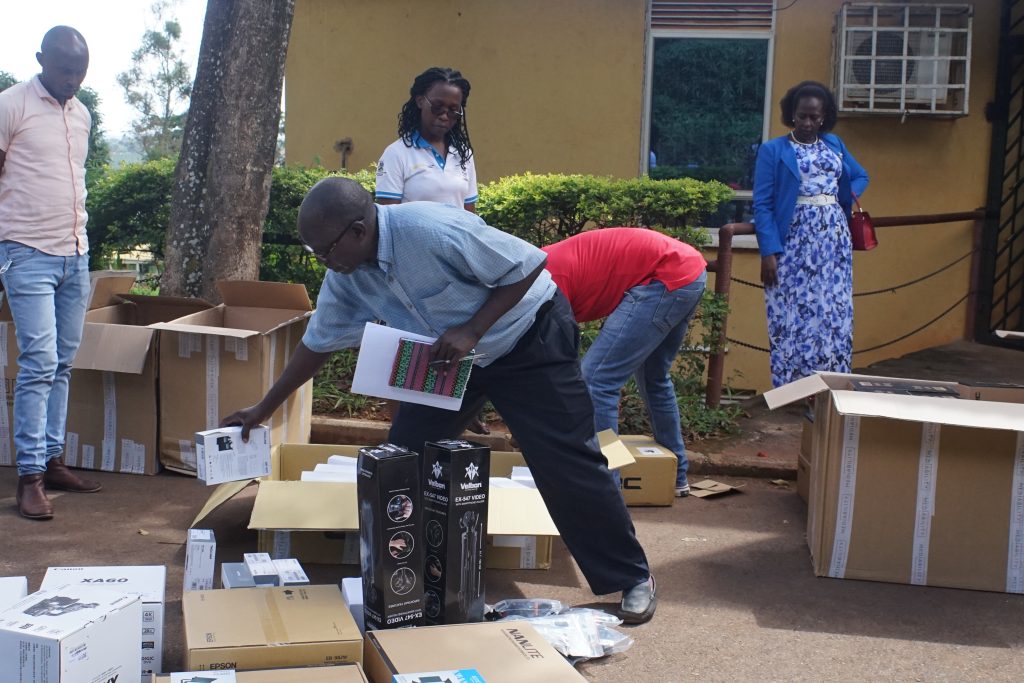By Eriah Lule
The School of Journalism, Media, and Communication of Uganda Christian University (UCU) has received multimedia equipment worth over 90 million Ugandan Shillings as a donation from the Norwegian Programme for Capacity Development in Higher Education and Research for Development (NORHED II).
The equipment is geared towards enhancing practical training in multi-media storytelling and production, a key emphasis at the school. Among the equipment are still and video cameras, laptops, projectors, and other assorted accessories. This is the first batch, but another batch will be received at the end of the year.
Prof. Monica Chibita, the Dean of the School of Journalism, Media, and Communication at UCU, affirmed that the support from the Norwegian government under the NORHED project has played a vital role in the school’s capacity building since 2014. Cumulatively, UCU has procured equipment and books worth over 800 million Ugandan shillings for the school. This includes over 600 book titles and the equipping of four training studios.
This support has helped build the school’s reputation as one of the top journalism, media, and communication institutions of higher learning in the region.
Chibita further noted that the NORHED project has not only provided equipment but also funded 5 PhDs that helped the school establish a Masters (MA) of Arts in Journalism and Media Studies and Strategic Communication, as well as transition from a department to a faculty and later a school in 7 years.

The school has since hired an additional senior lecturer as well as a professor of communication to strengthen their capacity for postgraduate training and research and has had a revised MA combining journalism and strategic communication accredited to meet the evolving needs of the industry.
Under the NORHED II project, the School of Journalism, Media, and Communication will offer 8–10 MA scholarships and 6 PhD scholarships tenable at UCU, with possible exchange opportunities to Norway and South Africa. In a bid to promote more equitable access to higher education, women will be encouraged to apply, and half the MA scholarships will be dedicated to people with disabilities.
Joseph Kiva, a lecturer at the school and a NORHED I MA scholarship beneficiary, noted that the exposure and knowledge he got from Norway during his exchange program have helped him directly in teaching and mentoring his students.
Chibita further noted that the school has submitted a PhD program in journalism, media, and communication to the National Council of Higher Education for accreditation and expects to launch it later this year. Like the two MA programs, the proposed PhD program will also be delivered through blended learning. Some of the newly acquired equipment will be useful in establishing a smart room to create a more conducive environment for e-learning.
She highlighted the project’s relevance for growing research at UCU. “Through this program, we have worked with other universities like the University of Rwanda, the University of Kwazulu-Natal in South Africa, and NLA University College in Norway to teach and conduct collaborative research involving our postgraduate students”, she said.
In one of his engagements, the Vice Chancellor of Uganda Christian University, Associate Professor Aaron Mushengyezi, encouraged the different schools at UCU to embrace blended learning. This way, it will be easier to grow the university’s potential into an e-campus that serves the global market.
“We should lead as others follow; blended learning doesn’t only empower our students but also enables us to outsource staff from different parts of the world”, he said.
Geoffrey Ssenoga, the technical instructor at the school, said the fact that the donation consists of sophisticated yet user-friendly equipment will break new boundaries and enable a smooth teaching and learning experience.
Francis Acaye, the studio technician, noted that the equipment is going to reduce the student-to-equipment ratio, which has been a big challenge. With this new development, it will be easy to monitor students and mentor them effectively.
“With this equipment, it’s easier to put students in small groups where we can reach them on a personal level and mentor them directly”, he said.
Zipporah Asimwe, a third-year Mass Communication student, feels humbled by the donation; she believes it is going to provide students access to modern equipment and more hands-on skills.
“Although I feel bad that the equipment has arrived when I am in my last semester, I am determined to utilize it to the maximum before I leave”, she said.
The school’s media training hub, The Standard Digital, is set to go fully multimedia. This means that students will now have a feel for television, print, digital, and radio under one roof.
John Semakula, the Head of Department, Undergraduate Studies at the School, says with this equipment, it will enable the Standard to produce quality multi-media stories that will market both the university and school. Adding that as a key part of the standard’s agenda is to increase the visibility of the school using multiple platforms.


